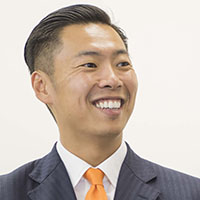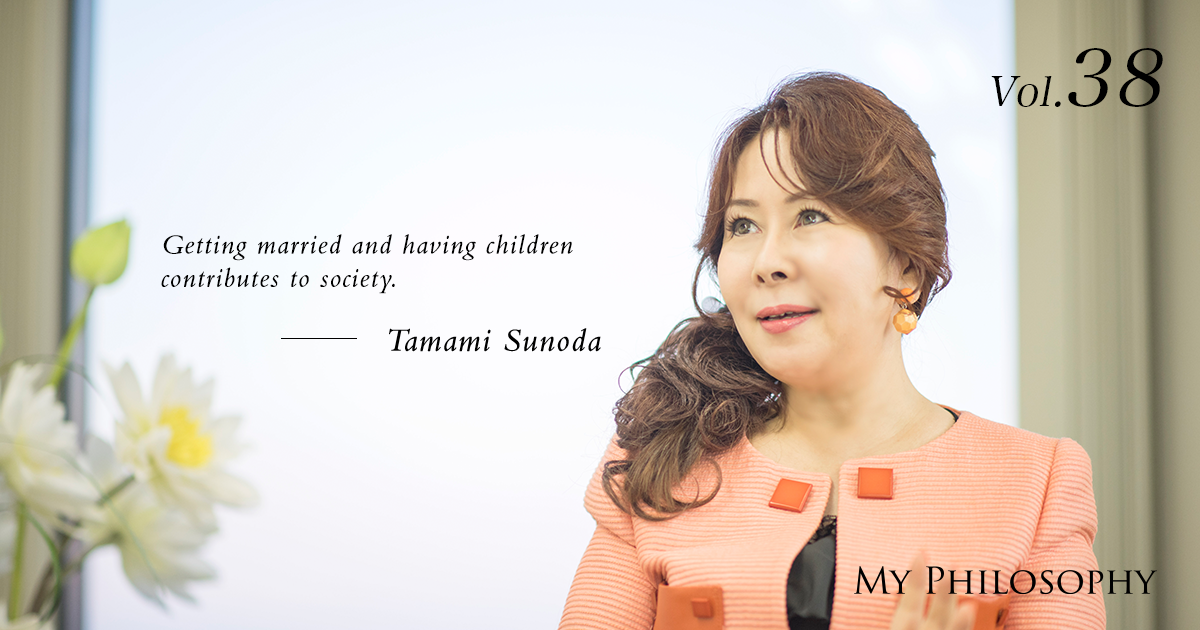
In the 38th edition, we welcomed Tamami Sunoda, the CEO of NOZZE, a major marriage consulting agency, who passionately discussed marriage while also addressing societal issues.
Profile
Vol.38 Tamami Sunoda
President and CEO of NOZZE (Marriage Information Center)| President, CEO, and Owner-Designer of Fashion Brand "JuviJuvi"
Together with her partner, she established Waseda Academy, a major preparatory school, and grew it into one of Japan's leading prep schools, listed on the Tokyo Stock Exchange's First Section. Approximately 20 years ago, she aspired to establish her own marriage information company and joined NOZZE, which had just been founded, for training purposes. In her second year at the company, she was promoted from a site advisor at the Shinjuku branch to the Head of Sales. In 2013, she was appointed President and CEO. Currently, she not only produces about 60,000 "dating with marriage in mind" relationships but also engages in various lectures, seminars, and writing activities.
In January 2016, she plans to publish her first book, Declaration of the Platinum Woman from Age 45!! - 46 Habits to Shine in Both Love and Work (45sai karano Platinum Jyoshi Sengen!! ~Koi mo Shigoto mo Saiko ni Kagayaku 46 no Shukan~), which is a culmination of her previous seminars and focuses on the theme of "living as a shining woman."
*Titles and positions are as of the time of the interview (October 2015).
Marriage is Life Itself
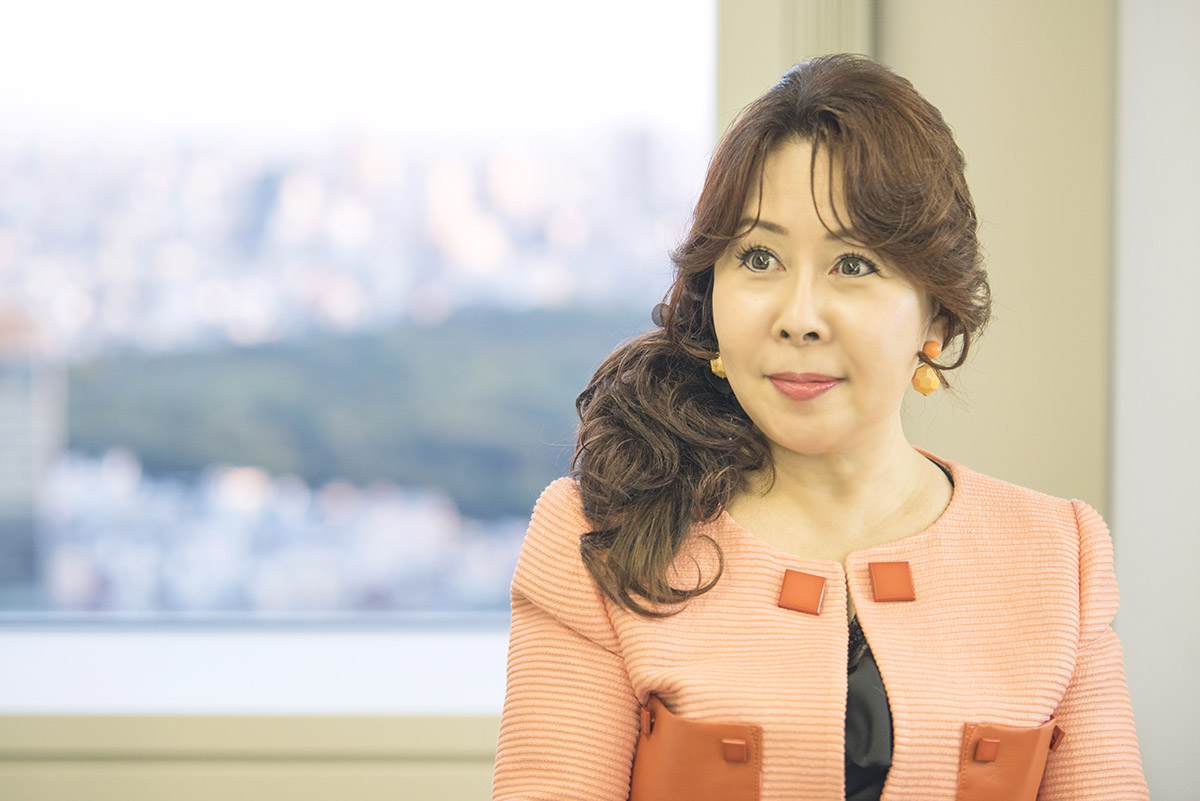 In Japan during the Heian period, there were visiting marriages, and marriage was more flexible than it is now. The Kamakura period, with its samurai society, introduced monogamy, and the current practice of entering the husband’s family registry began in the Meiji period. Compared to those times, modern lifestyles have significantly changed. I advocate that future marriages will be “borderless marriages.” According to statistics, one-third of couples who married recently end up divorcing. The most common reason cited is personality incompatibility, which, upon analysis, is often due to differences in lifestyle. Differences in food preferences, being a morning person versus a night person, or differing attitudes towards family—these are seemingly trivial matters that are hard to express. Even if they are expressed, changing them is difficult. The accumulation of such daily life frustrations often explodes under the guise of personality incompatibility.
In today’s rapidly changing world, annual income and job situations fluctuate constantly. The unchanging aspects are lifestyle and personality. Therefore, it is crucial to understand each other well in these areas and consider whether you can live together harmoniously. Marriage is about living together. While academic background and appearance are important, choosing someone who can seamlessly integrate into your current life and live happily with you will ensure longevity in the relationship. When considering marriage, the non-negotiable parts of your lifestyle should be prioritized. Each partner should compensate for the other’s deficiencies, but the core aspects should remain uncompromised. This is what I call a borderless marriage.
In Japan during the Heian period, there were visiting marriages, and marriage was more flexible than it is now. The Kamakura period, with its samurai society, introduced monogamy, and the current practice of entering the husband’s family registry began in the Meiji period. Compared to those times, modern lifestyles have significantly changed. I advocate that future marriages will be “borderless marriages.” According to statistics, one-third of couples who married recently end up divorcing. The most common reason cited is personality incompatibility, which, upon analysis, is often due to differences in lifestyle. Differences in food preferences, being a morning person versus a night person, or differing attitudes towards family—these are seemingly trivial matters that are hard to express. Even if they are expressed, changing them is difficult. The accumulation of such daily life frustrations often explodes under the guise of personality incompatibility.
In today’s rapidly changing world, annual income and job situations fluctuate constantly. The unchanging aspects are lifestyle and personality. Therefore, it is crucial to understand each other well in these areas and consider whether you can live together harmoniously. Marriage is about living together. While academic background and appearance are important, choosing someone who can seamlessly integrate into your current life and live happily with you will ensure longevity in the relationship. When considering marriage, the non-negotiable parts of your lifestyle should be prioritized. Each partner should compensate for the other’s deficiencies, but the core aspects should remain uncompromised. This is what I call a borderless marriage.
Education on Marriage in Schools
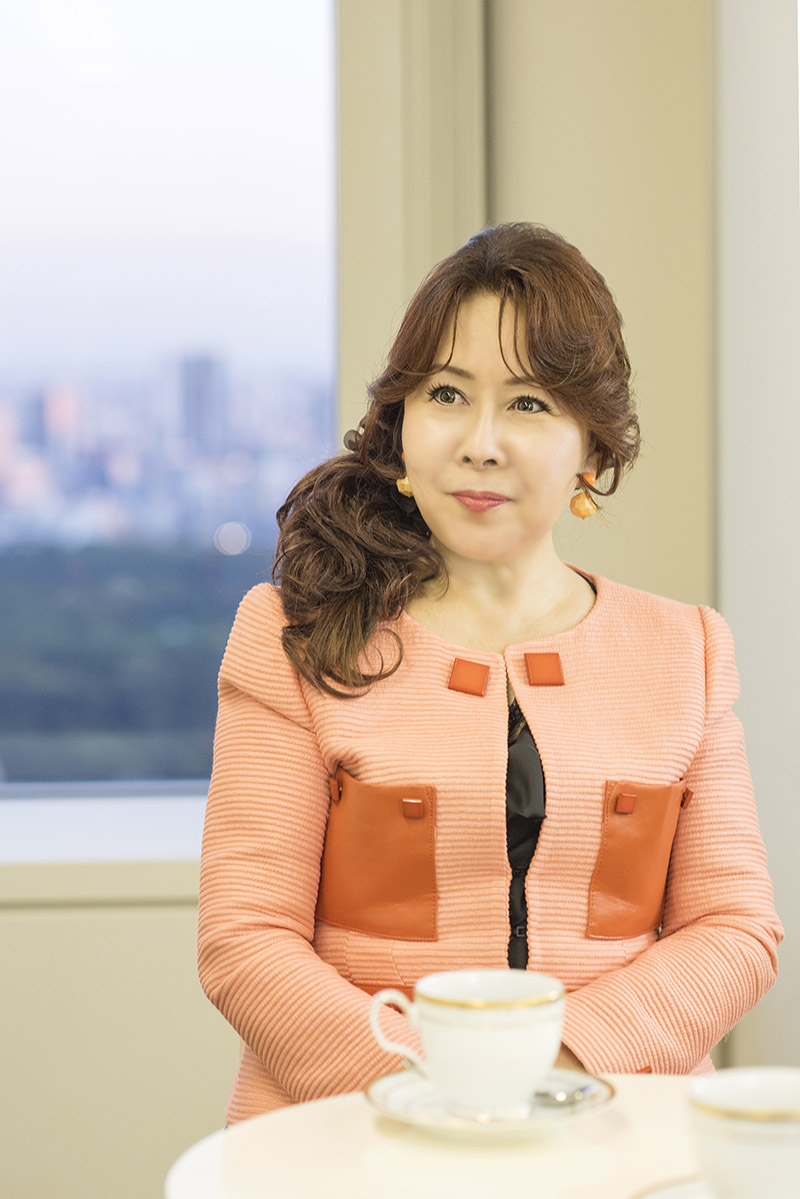 I believe that “marriage studies” should be properly taught in high school or university. Marriage is a part of sociology and an important educational theme that could influence a person’s way of life. Why do we need to get married? Do we possess the necessary communication skills for marriage? How many children should we have, and what is the ideal way to raise them? How should we handle issues with in-laws? How do we care for our partner in their old age? Marriage encompasses all of life’s challenges. While choosing to marry or not is a personal decision, teaching marriage as an academic subject should help individuals understand how their views on marriage are formed.
Parents’ marital lives have a significant impact on their children. A woman’s ability to trust men often depends on her father. If a father doesn’t contribute his salary or has issues with other women, the daughter is likely to develop a strong aversion to men. Many women who have been in long-term relationships but hesitate to marry often have such backgrounds. Therefore, regardless of their upbringing, schools should provide education on marriage that aligns with current social conditions. There are many people who struggle with issues like domestic violence or childcare and have no one to turn to for help. This is another crucial aspect of marriage. I find it puzzling why we don’t include education on marriage, covering these topics as well.
I believe that “marriage studies” should be properly taught in high school or university. Marriage is a part of sociology and an important educational theme that could influence a person’s way of life. Why do we need to get married? Do we possess the necessary communication skills for marriage? How many children should we have, and what is the ideal way to raise them? How should we handle issues with in-laws? How do we care for our partner in their old age? Marriage encompasses all of life’s challenges. While choosing to marry or not is a personal decision, teaching marriage as an academic subject should help individuals understand how their views on marriage are formed.
Parents’ marital lives have a significant impact on their children. A woman’s ability to trust men often depends on her father. If a father doesn’t contribute his salary or has issues with other women, the daughter is likely to develop a strong aversion to men. Many women who have been in long-term relationships but hesitate to marry often have such backgrounds. Therefore, regardless of their upbringing, schools should provide education on marriage that aligns with current social conditions. There are many people who struggle with issues like domestic violence or childcare and have no one to turn to for help. This is another crucial aspect of marriage. I find it puzzling why we don’t include education on marriage, covering these topics as well.
Children are Society’s Treasure
The increase in “herbivore men” is due to more people being alone during their 20s, a period crucial for personal growth. Getting married and becoming a father during this time, supporting each other as a couple, significantly enhances one’s human capabilities. By the late 30s, people have established their own ways of life, making it harder to compromise and more resistant to letting others into their personal space. In their 20s, individuals are still like blank slates, able to accept a wife and children into their lives, becoming “carnivorous dads” who strive hard. I believe humans grow by living as a couple and developing within a family. Marrying and having children in one’s 20s, and growing through mutual challenges in the household, contributes to society and enriches one’s own life. Having a partner instills a sense of responsibility. As long as a person is alone, they only think about themselves. Thinking only about oneself indicates a lack of genuine concern for society. When one has children, they start considering a society where their children can live safely and establish connections with the local community through their children. These elements lay the foundation for a constructive society. I believe that if more people remain single and focus solely on themselves, both public opinion and societal mental health will deteriorate. In parenting classes, it is essential to teach that children are society’s treasure, not just their parents’ responsibility. Simultaneously, it is crucial to educate children that becoming independent and forming their own families is the greatest way to honor their parents and contribute to society.Love is Action!
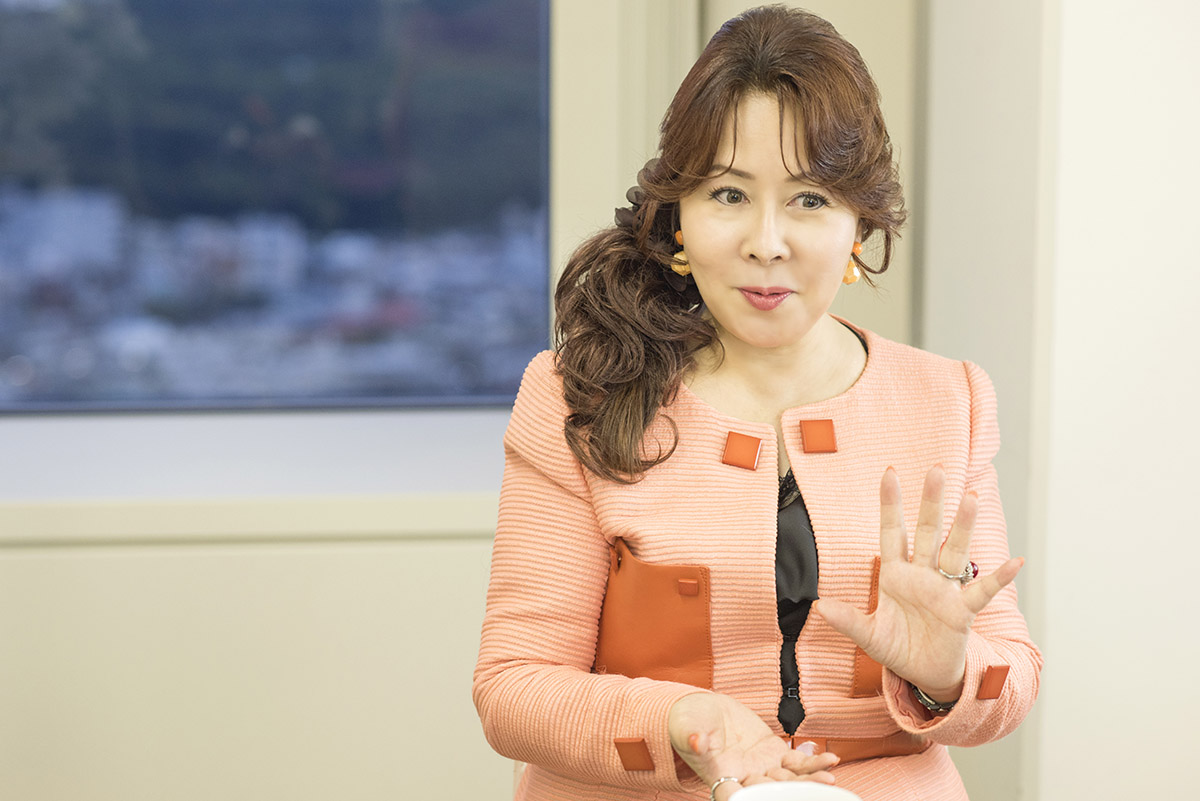 My motto is “Love is Action!” Love without action is completely meaningless. Just thinking that you like that person is not enough to get through to them. It is better to be courageous and say, “I made rice balls,” to convey your feelings. I believe that all actions are based on love. Striving for your dreams is an expression of self-love, and actions taken for your family stem from familial love. There are times when you want to act for the company without considering personal gain; that too is love. When people receive a lot of love, they start to give it back. A child raised with love will become someone who loves others. No one is born as a father or mother from the start. Becoming a better father, mother, husband, or wife is the result of accumulating small actions every day. Those whose daily actions are always aiming upwards are the ones who can radiate love.
Action equals living. Not taking action means merely existing. Living life while feeling alive every day is the happiest thing for a person. Therefore, move, work, and act. If the source of those actions is love, everything will connect seamlessly on a single line.
My motto is “Love is Action!” Love without action is completely meaningless. Just thinking that you like that person is not enough to get through to them. It is better to be courageous and say, “I made rice balls,” to convey your feelings. I believe that all actions are based on love. Striving for your dreams is an expression of self-love, and actions taken for your family stem from familial love. There are times when you want to act for the company without considering personal gain; that too is love. When people receive a lot of love, they start to give it back. A child raised with love will become someone who loves others. No one is born as a father or mother from the start. Becoming a better father, mother, husband, or wife is the result of accumulating small actions every day. Those whose daily actions are always aiming upwards are the ones who can radiate love.
Action equals living. Not taking action means merely existing. Living life while feeling alive every day is the happiest thing for a person. Therefore, move, work, and act. If the source of those actions is love, everything will connect seamlessly on a single line.
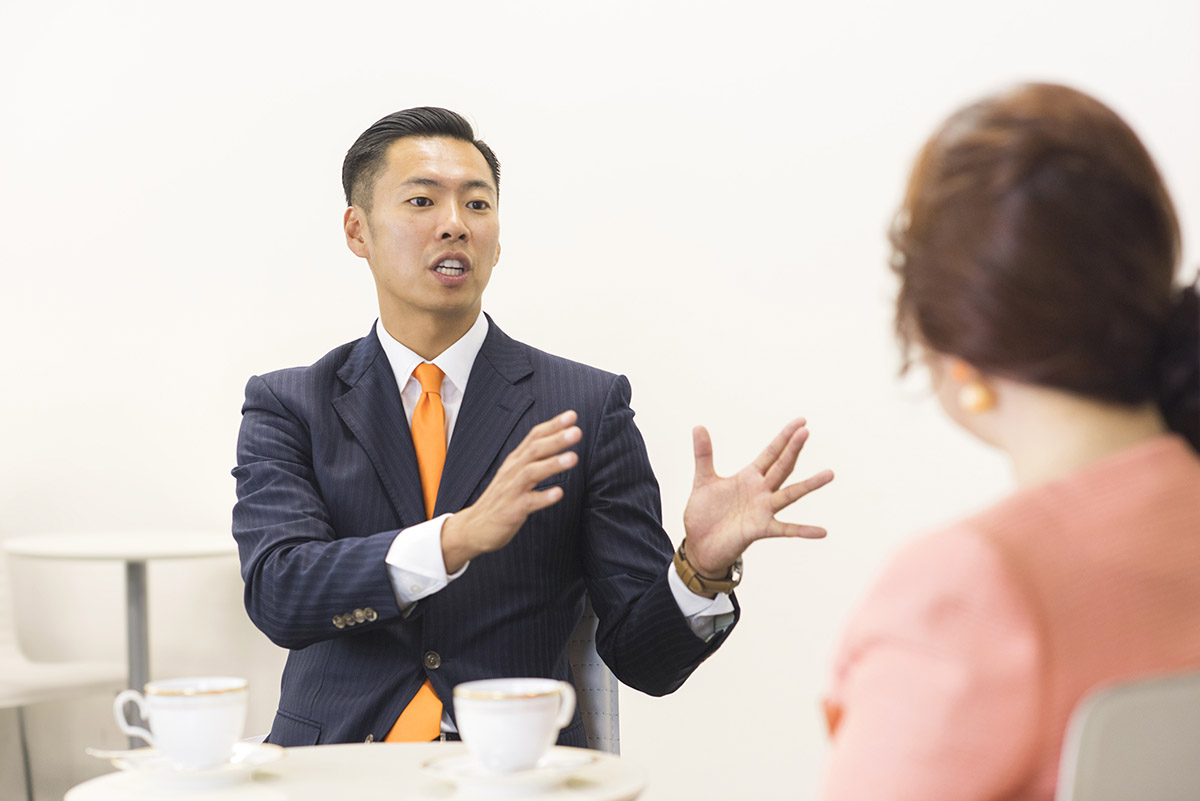

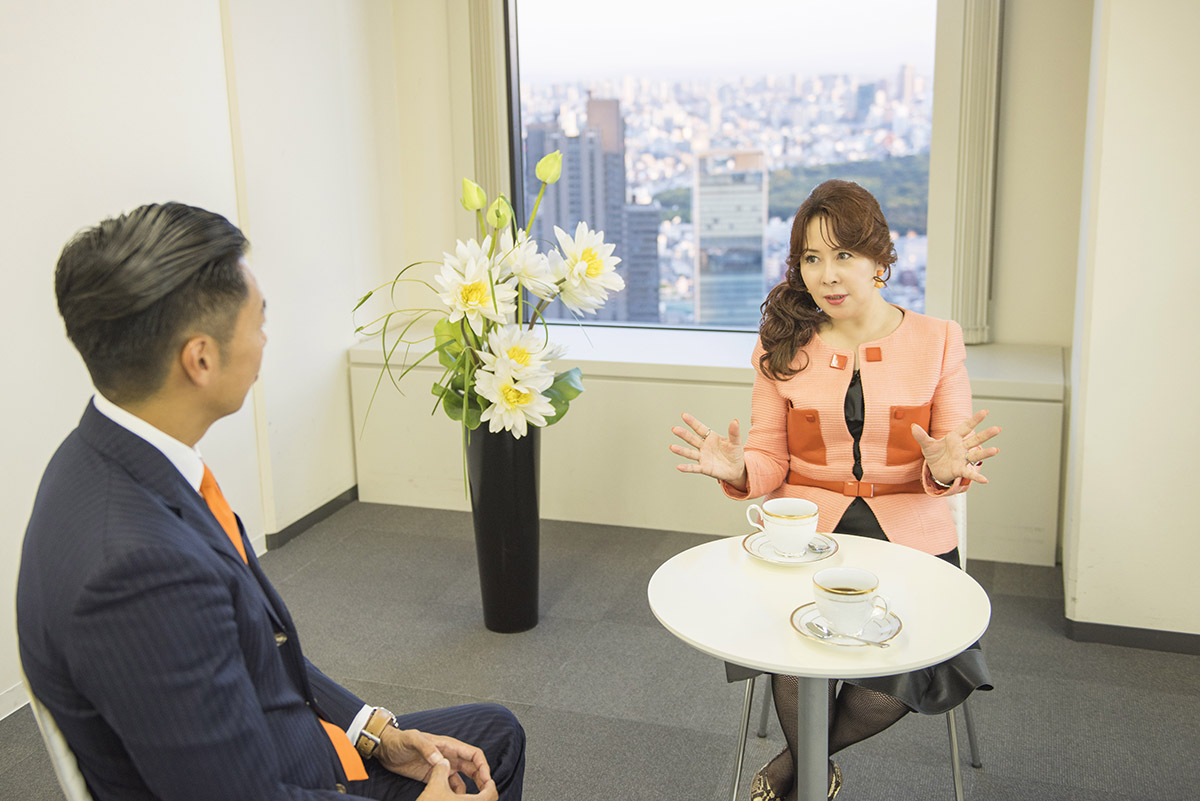
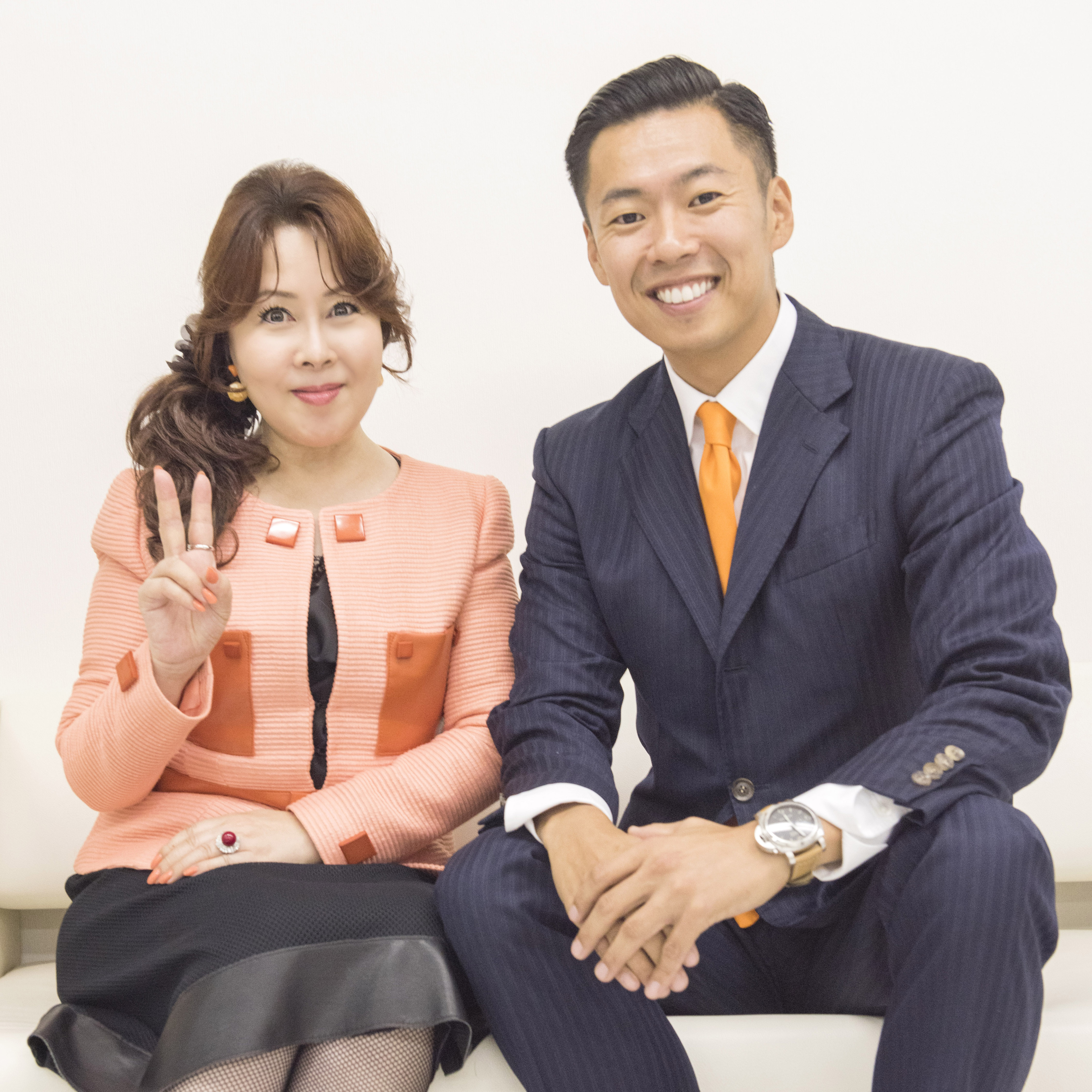
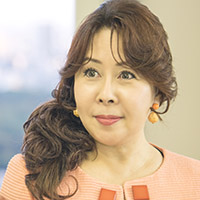 I had a very enjoyable time. Thank you. Mr. Sugiyama, you are truly a “man of action.” From the first time we met, I felt that you share the same sensibility as I do, with “Love is Action!” as your motto. You possess the dynamic nature of someone raised in America and the samurai spirit of the Japanese, excelling in balancing both work and family. Your “refreshing friendliness” allows you to seamlessly connect with others. Talking to you felt like talking to my late husband… (laughs). You really love people.
I am very excited to see what kind of messages you will share in your 40s and 50s.
I had a very enjoyable time. Thank you. Mr. Sugiyama, you are truly a “man of action.” From the first time we met, I felt that you share the same sensibility as I do, with “Love is Action!” as your motto. You possess the dynamic nature of someone raised in America and the samurai spirit of the Japanese, excelling in balancing both work and family. Your “refreshing friendliness” allows you to seamlessly connect with others. Talking to you felt like talking to my late husband… (laughs). You really love people.
I am very excited to see what kind of messages you will share in your 40s and 50s.
Tamami Sunoda. President and CEO of NOZZE (Marriage Information Center)
October 2015, at NOZZE (Marriage Information Center). Translated by ILI Inc.




